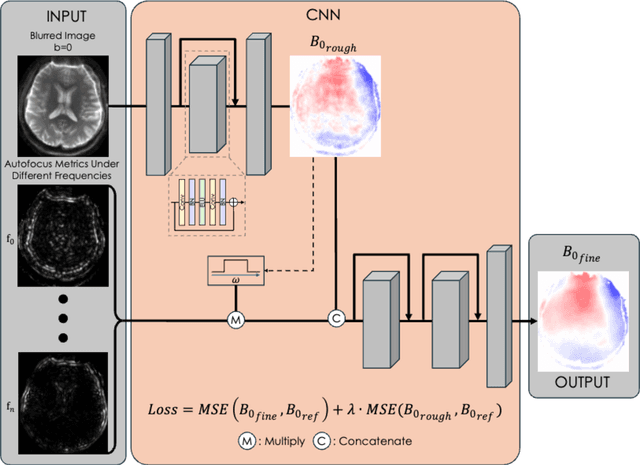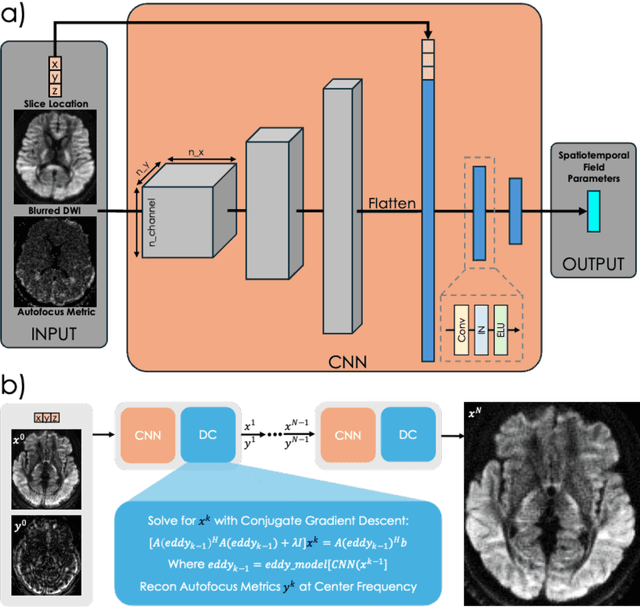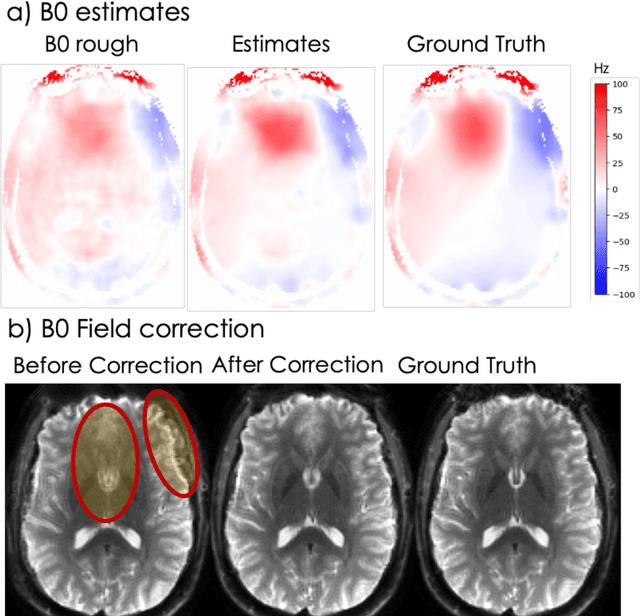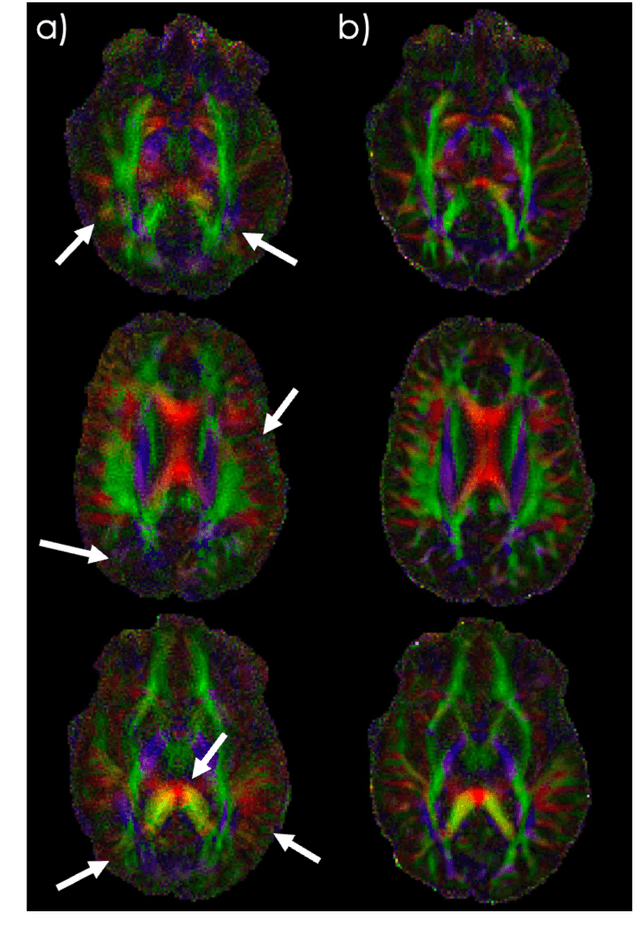Daniel Abraham
Fully 3D Unrolled Magnetic Resonance Fingerprinting Reconstruction via Staged Pretraining and Implicit Gridding
Jan 23, 2026Abstract:Magnetic Resonance Fingerprinting (MRF) enables fast quantitative imaging, yet reconstructing high-resolution 3D data remains computationally demanding. Non-Cartesian reconstructions require repeated non-uniform FFTs, and the commonly used Locally Low Rank (LLR) prior adds computational overhead and becomes insufficient at high accelerations. Learned 3D priors could address these limitations, but training them at scale is challenging due to memory and runtime demands. We propose SPUR-iG, a fully 3D deep unrolled subspace reconstruction framework that integrates efficient data consistency with a progressive training strategy. Data consistency leverages implicit GROG, which grids non-Cartesian data onto a Cartesian grid with an implicitly learned kernel, enabling FFT-based updates with minimal artifacts. Training proceeds in three stages: (1) pretraining a denoiser with extensive data augmentation, (2) greedy per-iteration unrolled training, and (3) final fine-tuning with gradient checkpointing. Together, these stages make large-scale 3D unrolled learning feasible within a reasonable compute budget. On a large in vivo dataset with retrospective undersampling, SPUR-iG improves subspace coefficient maps quality and quantitative accuracy at 1-mm isotropic resolution compared with LLR and a hybrid 2D/3D unrolled baseline. Whole-brain reconstructions complete in under 15-seconds, with up to $\times$111 speedup for 2-minute acquisitions. Notably, $T_1$ maps with our method from 30-second scans achieve accuracy on par with or exceeding LLR reconstructions from 2-minute scans. Overall, the framework improves both accuracy and speed in large-scale 3D MRF reconstruction, enabling efficient and reliable accelerated quantitative imaging.
Fast Reconstruction of Motion-Corrupted Data with Mobile-GRAPPA: Motion and dB0 Inhomogeneity Correction Leveraging Efficient GRAPPA
Nov 09, 2025Abstract:Advanced motion navigations now enable rapid tracking of subject motion and dB0-induced phase, but accurately incorporating this high-temporal-resolution information into SENSE (Aligned-SENSE) is often computationally prohibitive. We propose "Mobile-GRAPPA", a k-space "cleaning" approach that uses local GRAPPA operators to remove motion and dB0 related corruption so that the resulting data can be reconstructed with standard SENSE. We efficiently train a family of k-space-position-specific Mobile-GRAPPA kernels via a lightweight multilayer perceptron (MLP) and apply them across k-space to generate clean data. In experiments on highly motion-corrupted 1-mm whole-brain GRE (Tacq = 10 min; 1,620 motion/dB0 trackings) and EPTI (Tacq = 2 min; 544 trackings), Mobile-GRAPPA enabled accurate reconstruction with negligible time penalty, whereas full Aligned-SENSE was impractical (reconstruction times > 10 h for GRE and > 10 days for EPTI). These results show that Mobile-GRAPPA incorporates detailed motion and dB0 tracking into SENSE with minimal computational overhead, enabling fast, high-quality reconstructions of challenging data.
ACE-Net: AutofoCus-Enhanced Convolutional Network for Field Imperfection Estimation with application to high b-value spiral Diffusion MRI
Nov 21, 2024



Abstract:Spatiotemporal magnetic field variations from B0-inhomogeneity and diffusion-encoding-induced eddy-currents can be detrimental to rapid image-encoding schemes such as spiral, EPI and 3D-cones, resulting in undesirable image artifacts. In this work, a data driven approach for automatic estimation of these field imperfections is developed by combining autofocus metrics with deep learning, and by leveraging a compact basis representation of the expected field imperfections. The method was applied to single-shot spiral diffusion MRI at high b-values where accurate estimation of B0 and eddy were obtained, resulting in high quality image reconstruction without need for additional external calibrations.
Sequence adaptive field-imperfection estimation (SAFE): retrospective estimation and correction of $B_1^+$ and $B_0$ inhomogeneities for enhanced MRF quantification
Dec 15, 2023



Abstract:$B_1^+$ and $B_0$ field-inhomogeneities can significantly reduce accuracy and robustness of MRF's quantitative parameter estimates. Additional $B_1^+$ and $B_0$ calibration scans can mitigate this but add scan time and cannot be applied retrospectively to previously collected data. Here, we proposed a calibration-free sequence-adaptive deep-learning framework, to estimate and correct for $B_1^+$ and $B_0$ effects of any MRF sequence. We demonstrate its capability on arbitrary MRF sequences at 3T, where no training data were previously obtained. Such approach can be applied to any previously-acquired and future MRF-scans. The flexibility in directly applying this framework to other quantitative sequences is also highlighted.
Rapid Non-cartesian Reconstruction Using an Implicit Representation of GROG Kernels
Oct 16, 2023



Abstract:MRI data is acquired in Fourier space. Data acquisition is typically performed on a Cartesian grid in this space to enable the use of a fast Fourier transform algorithm to achieve fast and efficient reconstruction. However, it has been shown that for multiple applications, non-Cartesian data acquisition can improve the performance of MR imaging by providing fast and more efficient data acquisition, and improving motion robustness. Nonetheless, the image reconstruction process of non-Cartesian data is more involved and can be time-consuming, even through the use of efficient algorithms such as non-uniform FFT (NUFFT). This work provides an efficient approach (iGROG) to transform the non-Cartesian data into Cartesian data, to achieve simpler and faster reconstruction which should help enable non-Cartesian data sampling to be performed more widely in MRI.
 Add to Chrome
Add to Chrome Add to Firefox
Add to Firefox Add to Edge
Add to Edge